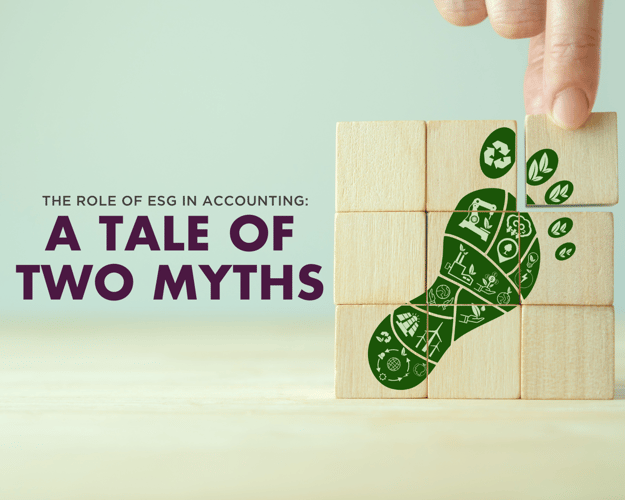Of the many topics we strongly emphasize to our clients in the accounting industry, transparency is high on the list. Not only is transparency legally required from an auditing and financial reporting standpoint, but it also ensures executives are held accountable for leading honest and successful businesses. Although we tend to focus primarily on financial transparency, “money isn’t everything,” as the saying goes.
The heart of what we do is advisory in nature, after all, and that often results in helping clients take actions that are highly visible to everyone (including customers, employees, investors, and regulators) and deeply impactful to their business.
One area where accounting professionals are increasingly being asked to weigh in on are Environmental, Social, and Governance reports, or ESGs. The role of ESGs in accounting isn’t always clear, and that’s because, by design, ESG reports aren’t financial. Instead, they exist, according to Deloitte, “to capture all the non-financial risks and opportunities inherent to a company's day to day activities.”
That said, the better you understand what ESGs are and why companies may want to create them, the more effectively you can respond when your clients come hat-in-hand asking for help.
Two Biggest Myths About ESG Reports
ESG reports are becoming an important business strategy, but not everyone sees it that way. As accountants, our job is to advise clients in ways that ensure their businesses are financially healthy and compliant. Many of them now ask about ESG reports, but that often comes with a misunderstanding of what ESG means to them at all.
The confusion around ESG reports can be summed up in two common myths: 1) ESG reports are only for publicly traded enterprise businesses, and 2) ESG reports are a political football centered in DEI.
Myth #1: ESG reports are just for big, publicly traded companies
The biggest complication with ESG reports is in the data collection, analysis, and reporting requirements. ESGs typically contain analysis of 150 to 200 data points, reported across dozens of pages. That kind of data is often difficult to both obtain and report on for small or medium-sized businesses.
Still, there’s a downstream impact on smaller businesses. Tier 1 companies that are increasingly required and dedicated to supplying ESG reports are making promises that impact their Tier 2 and Tier 3 suppliers. In effect, they’re asking (often telling) their subcontractors to adopt those business initiatives and changes as well. That results in smaller companies also having to provide ESG reports.
Alongside that, ESG reports are overwhelmingly beneficial, even if reporting is more difficult for smaller companies. At a high level, ESG reports provide visibility into the risks a business faces across those core areas (environmental, social, and governance) and how the business is responding to those risks.
ESG reports provide visibility into how a company is running its business. That ultimately provides confidence to customers and investors and helps meet the demands of younger workers who are increasingly asking potential and current employers to align with strategies that are better for people and the environment.
Myth #2: ESG reports are only about DEI
ESG reports have become a focal point in the ongoing culture wars in the U.S. For the most part, there’s a distinct conflation of ESG with DEI, leading to ESG reports becoming a hot-button topic.
It’s true that ESG reports contain elements of DEI. But ESG isn’t singularly about DEI. In fact, even the “Social” part of ESG reports — where DEI data and reporting tend to exist — is only partially about a company’s approach to diversity, equity, inclusion, and belonging.
Here’s what the reports cover:
-
The “Environmental” portion of ESG reports covers data on topics such as water usage, recycling, energy saving, etc. It provides transparency into how well the company understands its own environmental impact
-
The “Social” portion of ESG reports covers areas such as employee training and development expenditures, workplace incidents, health and wellness policies, unionization, and more. Only a small percentage of that deals with DEI.
-
The “Governance” portion of ESG reports covers general governance issues, reflecting the rights and responsibilities within the company and data on how decisions are made across leadership teams and boards.
ESG reports don’t have to make a political statement. Their purpose is to provide transparent data reporting on what a business is doing to address non-financial challenges that could potentially impact the financial health of the business.
For example, if a company has found a strategic way to reduce its water usage, this change may lower costs, but it would also be a data point in an ESG report. And if a company decides to launch new employee development programs, it will likely increase retention and productivity, both of which will be a net gain on revenue and profits. Yet reporting these in an ESG makes sense: they’re not specifically financial reporting, but instead providing transparency into these business strategies, which is overall great for the business and gives it a competitive advantage.
Many companies are completely dedicated to providing ESG reports and now see them as material to the business. In fact, Coca-Cola CEO James Quincy had this to say on the topic:
“If ESG becomes toxic as a phrase, which it basically has in the U.S., it doesn’t matter to me. I’m just going to stop saying ‘ESG.’...I’m saying this business will be great if I fix these problems, and it will be good for shareholders and be good for society.”
It’s hard to argue with an approach designed to improve the business in ways that improve relationships with customers, shareholders, and society as a whole.
How Can Accountants Provide Guidance on ESGs?
As accountants, and especially as CFOs, we tend to want to be the experts in everything related to a client’s business. But we can’t be everything to everyone. While ESG reporting isn’t something an accountant can or should be doing for a business, we can play a part in helping to steer clients in the right direction.
This can come in the form of:
-
Helping clients understand the scope and data required for ESG reports
-
Providing additional insight and clarification on why ESG reports are good for their business
-
Referring clients to the trusted service providers for ESGs.
The better we understand the business need, impact, and structure of ESG reports, the better we can help clients align these types of reports around their broader business strategy and how it influences revenue.
Interested in learning more about ESGs in accounting? Listen to our podcast with expert Kai Gray.
.png?width=120&height=77&name=Summit-Virtual-CFO_color_rgb%20(1).png)















